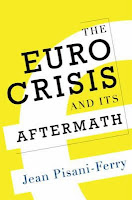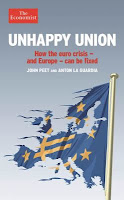Books to Get You Thinking
The recent financial crisis in Greece has once again brought the entire European Union into worldwide focus. A sizeable number of nations within the Eurozone are facing economic upheaval with low rates of growth, high unemployment particularly amongst younger age groups, and excessive levels of debt. However, it is the small island of Greece that is currently the epicenter of the crisis. With the current ratio of Greece’s debt to GDP a crushing 177 percent, there has been intense pressure to negotiate a bailout package for Greece to avert a major banking collapse and keep Greece a part of the Eurozone. It would be the country’s third bailout in the last five years. As a condition for further assistance, Greece was asked by its European creditors to implement a tighter budgetary policy, tax increases as well as an intensive overall oversight of the country by the European Union. What are the underlying causes of the crisis in Europe? What are the strategies and potential policy solutions that could help steer the nations in crisis out of their current economic woes? What does the future hold for the Eurozone? To understand the complexities and dynamics surrounding the economic crisis in Europe, readers can delve into the many fascinating books that the Mercer County Library System owns on this subject.
Understanding Crisis in Greece: From Boom to Bust by Michael Mitsopoulos and Theodore Pelagidis
Using a theoretical and empirical framework, the authors give a comprehensive portrait of the Greek economic and institutional system during the past fifteen years. The initial years following the launch of the euro saw a surge in economic growth in Greece largely driven by the competitive capital and credit markets and the boom in the tourism industry. Productivity increases followed investments in infrastructure and the deregulation of the telecommunications industry. Despite the strong performance, the initial surge was not sustainable due to a host of issues that resulted in lagging levels of competitiveness. The business environment was not conducive to growth, in large part as a result of excessive regulations of the market, high administrative costs, widespread corruption and the relatively poor performance of the public sector. The high levels of government expenditures failed to translate into jobs, and slower revenue growth meant rising ratios of debt. To ensure long term growth and a robust economy, it would be imperative to put in place strong institutions and governance that would remove the current dominance of entrenched interest groups in the political and socio economic structure, and replace it with an economy where profits flow from innovation-driven entrepreneurship in a competitive marketplace. As part of the financial package offered by the European Union, Greece was asked to implement structural reforms in the product, services and the labor markets along with cuts in expenditure, pension reform and steps to reign-in existing tax evasion that was rampant in the system.
The Euro Crisis and Its Aftermath by Jean Pisani-Ferry
Jean Pisani-Ferry, economist and Chief of the Policy Planning Staff for the French Prime Minister, has authored this lucid and well-researched analysis of the origins and history of the euro, and the inbuilt contradictions and imbalances that led to the crisis in 2010. The author details the different and conflicting analytical frameworks that exist today when viewing the economic weakness of the Eurozone, each of them associated with a different spectrum of potential measures to address the crisis. One view, held by Germany, attributes the current European woes to a lack of discipline in some member countries, notably Greece in following the policy guidelines laid out when forming the common currency. This view sees a tighter fiscal policy including cuts in expenditure and pensions, improved governance and removal of tax evasion as effective policy solutions. Jean Pisani Ferry discusses an alternative framework that focuses on the structural weakness inherent in the foundations of the euro. While the underlying raison d’etre behind the euro was the dream of a united federal Europe, in reality it became a system founded on conflicting interests of member countries that varied widely in their levels of economic development, levels of competitiveness, structure of taxes and expenditures and systems of market regulations. The weak integration of product and labor markets, limited financial integration and the lack of a common budget are viewed as key to the economic debacle. The author also analyzes the policies pursued by individual members of the Eurozone in response to the US financial crisis of 2008 and their contribution to the escalating crisis in Europe. To ensure long term viability and growth for the region, the author stresses the importance of building a sense of common purpose, trust and leadership among the nations of the European Union.
Unhappy Union: How the Euro Crisis and Europe Can Be Fixed by John Peet and Anton La Guardia
John Peet and Anton La Guardia, both journalists at the Economist, provide a concise account of how and why the common currency of euro was set up, and a chronological discussion of the challenges and crises that the euro nations have faced since their inception. The crises and continuing problems are placed in juxtaposition to the initial shortcomings and mistakes made in formulating the structure of the common euro currency. Instead of political unification leading to a unified currency, they envisaged a single currency paving the way for a common European bloc. Major oversights also followed in the response of the euro countries to the US financial crisis of 2008. The mounting debts and non competitiveness of countries as Italy and Greece were attributed to their failure to abide by the rules of fiscal discipline rather than recognizing, “the property bubbles, imbalances, and the unstable structure of the eurozone.” The authors advocate deep reforms at both the political and economic levels that would address the imbalances between the southern debtor and the northern creditor nations, and ensure sustainable long term growth of the debt ridden Southern countries and the future integrity of the Union. Reforms must address the current heavy political structure that often conflicts with individual national interests, create a bigger federal budget that would be available during an economic crisis, offer higher levels of shared risk taking, and implement a more integrated banking system as well as an increased role for euro bonds. In reality, such measures would be difficult to achieve in the face of existing political constraints.
Understanding Crisis in Greece: From Boom to Bust by Michael Mitsopoulos and Theodore Pelagidis
Using a theoretical and empirical framework, the authors give a comprehensive portrait of the Greek economic and institutional system during the past fifteen years. The initial years following the launch of the euro saw a surge in economic growth in Greece largely driven by the competitive capital and credit markets and the boom in the tourism industry. Productivity increases followed investments in infrastructure and the deregulation of the telecommunications industry. Despite the strong performance, the initial surge was not sustainable due to a host of issues that resulted in lagging levels of competitiveness. The business environment was not conducive to growth, in large part as a result of excessive regulations of the market, high administrative costs, widespread corruption and the relatively poor performance of the public sector. The high levels of government expenditures failed to translate into jobs, and slower revenue growth meant rising ratios of debt. To ensure long term growth and a robust economy, it would be imperative to put in place strong institutions and governance that would remove the current dominance of entrenched interest groups in the political and socio economic structure, and replace it with an economy where profits flow from innovation-driven entrepreneurship in a competitive marketplace. As part of the financial package offered by the European Union, Greece was asked to implement structural reforms in the product, services and the labor markets along with cuts in expenditure, pension reform and steps to reign-in existing tax evasion that was rampant in the system.
The Euro Crisis and Its Aftermath by Jean Pisani-Ferry
Jean Pisani-Ferry, economist and Chief of the Policy Planning Staff for the French Prime Minister, has authored this lucid and well-researched analysis of the origins and history of the euro, and the inbuilt contradictions and imbalances that led to the crisis in 2010. The author details the different and conflicting analytical frameworks that exist today when viewing the economic weakness of the Eurozone, each of them associated with a different spectrum of potential measures to address the crisis. One view, held by Germany, attributes the current European woes to a lack of discipline in some member countries, notably Greece in following the policy guidelines laid out when forming the common currency. This view sees a tighter fiscal policy including cuts in expenditure and pensions, improved governance and removal of tax evasion as effective policy solutions. Jean Pisani Ferry discusses an alternative framework that focuses on the structural weakness inherent in the foundations of the euro. While the underlying raison d’etre behind the euro was the dream of a united federal Europe, in reality it became a system founded on conflicting interests of member countries that varied widely in their levels of economic development, levels of competitiveness, structure of taxes and expenditures and systems of market regulations. The weak integration of product and labor markets, limited financial integration and the lack of a common budget are viewed as key to the economic debacle. The author also analyzes the policies pursued by individual members of the Eurozone in response to the US financial crisis of 2008 and their contribution to the escalating crisis in Europe. To ensure long term viability and growth for the region, the author stresses the importance of building a sense of common purpose, trust and leadership among the nations of the European Union.
Unhappy Union: How the Euro Crisis and Europe Can Be Fixed by John Peet and Anton La Guardia
John Peet and Anton La Guardia, both journalists at the Economist, provide a concise account of how and why the common currency of euro was set up, and a chronological discussion of the challenges and crises that the euro nations have faced since their inception. The crises and continuing problems are placed in juxtaposition to the initial shortcomings and mistakes made in formulating the structure of the common euro currency. Instead of political unification leading to a unified currency, they envisaged a single currency paving the way for a common European bloc. Major oversights also followed in the response of the euro countries to the US financial crisis of 2008. The mounting debts and non competitiveness of countries as Italy and Greece were attributed to their failure to abide by the rules of fiscal discipline rather than recognizing, “the property bubbles, imbalances, and the unstable structure of the eurozone.” The authors advocate deep reforms at both the political and economic levels that would address the imbalances between the southern debtor and the northern creditor nations, and ensure sustainable long term growth of the debt ridden Southern countries and the future integrity of the Union. Reforms must address the current heavy political structure that often conflicts with individual national interests, create a bigger federal budget that would be available during an economic crisis, offer higher levels of shared risk taking, and implement a more integrated banking system as well as an increased role for euro bonds. In reality, such measures would be difficult to achieve in the face of existing political constraints.
-Nita Mathur



Great book recommendations about the Euro crisis!
ReplyDelete